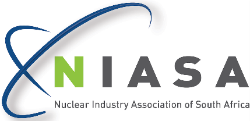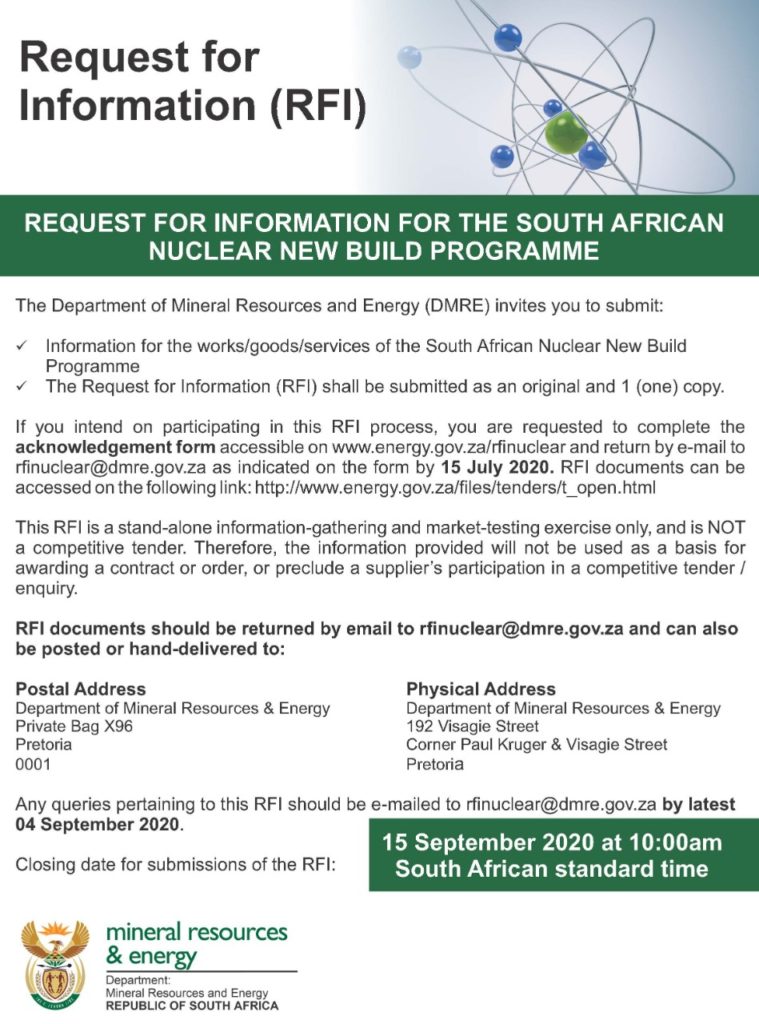- August 29, 2018
- Posted by: docmedia
- Category: News
The occasion of the 2018 Women in Nuclear Conference hosted in Midrand coincided with several other poignant events.
These are the centenary celebrations of the birth of Mama Albertina Sisulu, Women’s Month and the release of the Integrated Resource Plan (IRP) by the Minister of Energy, Jeff Radebe.
The Department of Energy’s commitment to a diversified energy mix implies the inevitable inclusion of nuclear energy. Speakers and panel members at our conference, mainly women in the nuclear industry, reflected on the unfortunate misunderstanding of nuclear technology in general and the mistaken perception that it is all about electricity.
It is the duty of professionals like members of Niasa, Women in Nuclear South Africa (WiNSA) and South African Young Nuclear Professionals’ Society (SAYNPS) to demystify this.
Why should we talk about nuclear technology at this point? Apart from the conference and IRP announcement, South Africa has an established track record and capacity in the nuclear domain that cannot be neglected. Decades of investment in research and development, applications and operational expertise have produced the likes of Koeberg Nuclear Power Plant, the Safari-1 Reactor and NTP Radioisotopes, among others. The country continues to build its nuclear medicine capacity.
The Safari-1 Reactor places South Africa among the top three largest producers of radioisotopes globally. This contributes in excess of R1 billion in foreign exchange annually.
The reason all these benefits have remained off the national radar shaped by our media discourse has been the perceived corruption and costs linked to the Nuclear Expansion Build Programme. This is aggravated by the age-old portrayal of nuclear technology as being unsafe. Although there have been global nuclear-related incidents such as the Chernobyl Disaster of 1985 and Fukushima in 2011, the comprehensive merits of nuclear technology cannot be underestimated.
In her keynote address at the Women in Nuclear Conference, Ambassador Thembisile Majola, the deputy minister of energy, emphasised that nuclear technology presents plenty of other benefits, beyond electricity. Agriculture, mining and industrial applications are other significant sectors within the nuclear industry value chain.
It is a cleaner technology overall that contributes to crop farming and livestock. The International Atomic Energy Agency (IAEA) has demonstrated over years that nuclear techniques can advance climate-smart agriculture. Examples include the development of varieties of plants that are tolerant to drought, the ability to select animals that are resistant to diseases and improving the management of water resources. Considering how water-stressed South Africa is, this application is beckoning for us to leverage it for the alleviation of drought and the improvement of the competitiveness of our agricultural sector.
Nuclear techniques can also be used to monitor ocean acidification or greenhouse gases in the atmosphere. Our ocean economy and the general thrust to minimise the effects of climate change stand to benefit, if only we made a bit more effort to appreciate the technology. The list is longer.
In health, radiation oncology and radiology are but some of the numerous applications worth mentioning. Both the diagnosis and treatment of cancer have used nuclear technology for close to a century. Nuclear medicine can improve the quality of health care across Africa. With several African countries already members of the IAEA, our conscious efforts to understand nuclear technology better can only accelerate the ability of African countries to identify and treat diseases and health conditions early.
However, concerns about the safety of nuclear technology – especially radiation protection and waste management – cannot simply be dismissed. South Africa actively participates in international organisations and partnerships to manage the risk of radiation exposure. Among others, our nuclear professionals and government officials participate actively in structures such as the International Radiation Protection Association through its South African chapter (Sarpa).
Furthermore, the Department of Energy has established the Nuclear Radioactive Waste Disposal Institute (NRWDI) to operate the low-level waste management facilities at Vaalputs in the Northern Cape, as well as to advance the national capability to manage and dispose of all radioactive wastes in the country. This is the newest state-owned entity added to the value chain to manage the risk of exposure to nuclear waste.
The capacity and capability of the industry and its entities is continuously being strengthened through education, training, public awareness and performance monitoring. NIASA, as a voluntary membership-based organisation that is committed to promoting the highest standards in the development and application of nuclear technology in the country, recognises the significance of strengthened co-operation with all relevant stakeholders in the nuclear industry to unlock inclusive economic development.
As a leading economy in Africa, our holistic appreciation of nuclear technology is called for to enable us to lead the continent in the optimisation of its adoption and application.
* Ncemane, Pr. Eng. (ECSA) – President of the Nuclear Industry Association of South Africa
Originally published on: www.iol.co.za

 Welcome to popups plugin
Welcome to popups plugin